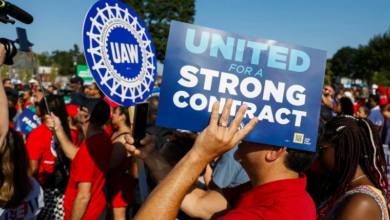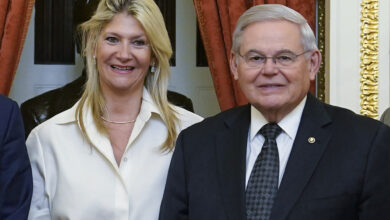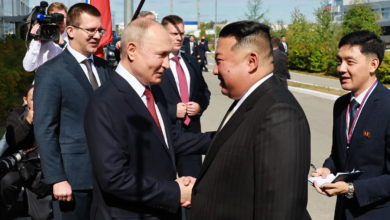Will Nigeria’s Cash Chaos Impact Elections?

Welcome to Foreign Policy’s Africa Brief.
The highlights this week: Ethiopia’s church schism, West African juntas want ECOWAS and AU to welcome them back, and South Africa gives up on a Tottenham Hotspur sponsorship.
If you would like to receive Africa Brief in your inbox every Wednesday, please sign up here.
Long Waits at Gas Stations, ATMs Test Nigerians’ Patience
In the run-up to elections on Feb. 25, Nigerians are having to wait in hours-long lines for money and fuel amid an acute cash and gasoline shortage in a country that was once Africa’s largest producer of petroleum.
Growing dissatisfaction with Nigeria’s ruling All Progressives Congress (APC) will make this the most closely fought election in Nigeria’s history and could lead to higher voter turnout, predicts Lagos-based consultancy SBM Intelligence.
Worryingly, Nigeria’s Independent National Electoral Commission warned that fuel and cash scarcity could disrupt payment of logistics staff and transportation of materials needed for polling. Decades of underinvestment and rampant fuel theft have impacted oil output. There are not enough state-run refineries, so Nigeria imports its fuel needs and exports crude oil, which has led to shortages at gas stations. And those with supplies are charging more than double the regulated pump price.
Read More About : Low Fade Vs Mid Fade
The Nigerian Central Bank’s botched replacement of higher-value 200-, 500- and 1,000-naira notes has caused Nigerians further suffering. The central bank argued that the redesign announced in late October would force residents to bank their money, as more than 80 percent of money in circulation was held outside of the banking system. It said it would limit ATM withdrawal amounts to promote a cashless society.
Nigeria’s federal government also seemed to believe that the currency swap would curb vote buying in presidential elections by reducing the number of naira in circulation. This is unlikely as vote buying also takes places using dollars. Many Nigerians offloaded old notes into their bank accounts under a deadline that was extended until Feb. 10. But amid a shortage of the new currency, Nigerian banks are enforcing daily maximum withdrawal limits of between 5,000 and 20,000 naira (about $6.50 to $27 dollars according to the unofficial exchange rate widely used in the country), with some shutting their doors to customers demanding access to their own cash. It has caused chaos in an economy that is primarily cash-based despite the government’s efforts to leapfrog it into a cashless one.
I was recently unable to buy a takeout meal because, like many Nigerians, I only had access to old banknotes, which some merchants have stopped accepting.
In Nigeria’s financial capital of Lagos, the unfolding crisis has led to long waits at supermarkets and gas stations as electronic payments take hours to complete under an infrastructure ill-equipped for digital point of sale transactions. A side economy has sprung up selling cash for cash, with profits of around 10-20 percent, according to Guardian Nigeria. And the people most affected are the rural poor who are largely unbanked and with even more limited access to new currency. In Ibadan, a southern city around 75 miles from Lagos, huge crowds could be seen outside of banks early in the morning as people lined up to try to withdraw from ATMs.
Bank managers have been accused of hoarding the new currency to supply their elite customers and raising point of sale and ATM withdrawal fees. SBM Intelligence suggested history was repeating itself after Nigeria faced a similar failed currency swap 40 years ago under current Nigerian President Muhammadu Buhari.
The currency plan has highlighted divisions within the ruling APC government. At least seven states—Ekiti, Kaduna, Kogi, Kano, Zamfara, Ondo, and Ogun (all led by APC governors)—have sued the federal government over it, and Nigeria’s Supreme Court temporarily halted the deadline to stop using old banknotes until the conclusion of the lawsuits. However, Nigeria’s central bank has refused to acknowledge the court order.
Roughly 60 percent of Nigerians don’t have bank accounts in rural areas, where there are often no bank branches or ATMs—and those who do cannot access their savings because banks have shut down to implement the new policy. The APC’s contender, multibillionaire Bola Ahmed Tinubu, believes the currency policy was deliberately crafted by his fellow party members to sabotage his campaign. His allies agree. Kaduna State Gov. Nasir Ahmad el-Rufai said he believed unnamed “elements” in the Presidential Villa want Tinubu to lose. “They had their candidate. Their candidate did not win the primaries,” el-Rufai told Channels TV.
Across the country, election rumors and theories abound. Some of Tinubu’s supporters believe Buhari (who cannot run in the elections, having served the maximum term limit) is secretly banding with Atiku Abubakar of the main opposition People’s Democratic Party (PDP). Both Abubakar and Buhari are Fulani from Nigeria’s northern region, whereas Tinubu is a Yoruba Muslim from the south. Buhari has since appeared alongside Tinubu at rallies in key northern states and on Monday said he backed Tinubu “100 percent.” Meanwhile, Nigerians supporting opposition parties also believe the policy was conceived to ensure the APC is the only party able to engage in vote buying by controlling currency access.
Whether widespread anger and confusion will deliver a win to underdog candidate Peter Obi is still debatable. Obi is an ex-PDP member and former southeast Anambra State governor. His smaller Labour Party has no sitting governors in Nigeria’s 36 states. Voting along ethnic and religious lines also complicates predictions.
A series of Bloomberg polls that forecast an Obi victory has been widely scrutinized by Nigerians. Obi’s opponents dismiss him as a “social media candidate.” His popularity has been largely driven by young Nigerians who want a change from the old guard. They have registered to vote in record numbers, antagonized by violence from Nigeria’s security forces during the #EndSARS protests of 2020. But his opponents contend that an Igbo Christian candidate from the southeast cannot collect enough votes in key states across the predominantly Muslim north or Tinubu’s southwestern Yoruba stronghold, which includes Lagos.
To win overall, candidates need the highest number of votes and 25 percent of votes in two-thirds of Nigeria’s states. If no one achieves this, then Nigeria could have its first ever runoff. Turnout could tip the balance. One poll by Lagos-based media company Stears predicted that Obi will win in the event of high participation, but low turnout would deliver Tinubu the victory, particularly if young people don’t vote. Turnout dropped to an all-time low of around 35 percent in the last 2019 presidential election, with voters put off by election day violence.
Buhari has set up a transitional team that will usher in a new government on May 29 after the forthcoming election. Whoever wins the presidency will determine the future of Africa’s largest nation and one of the world’s most culturally diverse countries. There are around 370 ethnic groups and more than 520 languages spoken in Nigeria.
This election will shape whether the country can halt various separatist movements and an unprecedented mass youth exodus among those exasperated by Nigeria’s worsening economic outlook.
Wednesday, Feb. 15: Ghana, Nigeria, and Botswana release inflation figures for January.
Wednesday, Feb. 15, to Thursday, Feb. 16: Foreign ministers meet at African Union summit in Addis Ababa, Ethiopia.
Friday, Feb. 17, to Monday, Feb. 27: South Africa hosts the Chinese and Russian navies in a military exercise.
Saturday, Feb. 18, to Sunday, Feb. 19: African Union leaders host a summit.
Saturday, Feb. 25: Nigerians vote in elections for the House of Representatives, Senate and president.
Ethiopia’s church rift deepens. Ethiopia restricted social media and other messaging platforms following a fracture within Ethiopia’s Orthodox Christian Church and threats of protests. Clerics from Oromia and the Southern Nations, Nationalities, and Peoples’ Region accused the main church of ethnic discrimination and a lack of inclusivity. Last month, they formed a breakaway group. But on Friday, a court in Ethiopia placed an injunction on the rebel clergy and banned them from entering churches belonging to the main Orthodox Church.
The Orthodox Church had accused Ethiopia’s government of backing the splinter group and threatened to hold mass rallies on Sunday, but it postponed demonstrations after Ethiopian Prime Minister Abiy Ahmed met with the leaders of the Orthodox Church and agreed not to recognize the breakaway group. As Andrew DeCort wrote in Foreign Policy last June, a form of Christian nationalism is growing across Ethiopia, particularly “in Oromia and the southern regions of Ethiopia, where many have felt oppressed and impoverished by Ethiopia’s Orthodox empire.”
South African President Cyril Ramaphosa delivers his 2023 state of the nation address at the Cape Town City Hall in Cape Town, South Africa, on Feb. 9.
South African President Cyril Ramaphosa delivers his 2023 state of the nation address at the Cape Town City Hall in Cape Town, South Africa, on Feb. 9.ESA ALEXANDER/POOL/AFP via Getty Images
South Africa declares “state of disaster.” South African President Cyril Ramaphosa said he will appoint an electricity minister and declare a state of disaster to respond to the country’s energy crisis. Ramaphosa said in a state of the nation address late Thursday evening that essential services like hospitals would be exempt from blackouts. Plans also include tax breaks for businesses and households that generate their own solar power. Staged power cuts of up to eight hours a day have significantly damaged South Africa’s economy.
At the annual Mining Indaba event in Cape Town, South Africa’s resource and energy minister, Gwede Mantashe, told the industry that the power outages cost the economy 1 billion rand (about $56 million) per day.
Coup countries seek bloc readmission. The foreign ministers of Mali, Guinea, and Burkina Faso are seeking reentry to the Economic Community of West African States (ECOWAS) and the African Union after being suspended for military coups. Foreign ministers from the three countries held talks in Burkina Faso’s capital, Ouagadougou, and agreed to join efforts in their push to be reinstated. Since seizing power, the juntas in all three countries have struggled to deal with escalating attacks by jihadis and armed groups. Political ostracization has impacted their ability to pool regional resources to combat the violence.
ECOWAS has demanded that the countries prepare a swift transition to civilian rule. Instead, countries such as Mali have resisted democratic pressures and instead rely on the Russian paramilitary Wagner Group to maintain security. During a visit to Mali’s capital, Bamako, last week, Russian Foreign Minister Sergey Lavrov pledged further support to all Sahel states fighting terrorism.
Fighting in Somaliland. The leaders of Somalia’s breakaway region Somaliland agreed to an unconditional cease-fire late on Friday after five days of heavy fighting. Clashes broke out in the northeastern city of Las Anod after clan elders declared an intention to rejoin Somalia and Somaliland security forces began shelling the city, claiming they had come under militia attack. For the last 30 years, the self-declared nation has functioned as a relatively peaceful de facto state, with its own currency, military, government institutions, and regular democratic elections since 1991. But the violence could harm the state’s quest to become internationally recognized as a sovereign nation.
South African soccer sponsorship. South Africa’s tourism agency has scrapped a 1 billion rand (about $56 million) deal to sponsor the English soccer club Tottenham Hotspur—detailed in last week’s brief—following widespread public anger and parliamentary opposition. The deal had been conditionally approved but not yet finalized, yet three members of the South African government’s tourism board resigned after the plans were made public.
OUTA, a nonprofit advocacy group against tax abuse, called the deal “a serious waste of money,” noting that the spend was “largely aimed at the U.K. visitors, which is only around 25 percent of South Africa’s inbound tourism market.” The South African Parliament’s tourism committee wants an investigation into how the sponsorship was allowed to progress “because there’s everything and a lot wrong about the deal itself,” said chairperson Tandi Mahambehlala.
In Nigeria, underdog candidate Peter Obi’s popularity has been fueled by Nigerians disenchanted by a lack of jobs, rising insecurity, and poor oil outputs that have dragged the economy down. Oil production has consistently declined since the start of Buhari’s second term in office in 2019.
Egyptian privatization. In Mada Masr, Ahmed Bakr and Salma Hindy examine government plans to sell off state-owned companies as part of conditions for a $3 billion bailout from the International Monetary Fund, which would see the Egyptian government reduce the military’s footprint in key sectors of the economy and level the playing field for private sector growth. Privatization could provide an alternative to Egypt’s reliance on hot money from the bond market, which has proved disastrous for Egypt’s economy since Russia’s invasion of Ukraine. Persian Gulf-based wealth funds, already making various purchases of Egyptian state-owned assets, are likely to be the targeted buyers, the authors write.
Regional disparities. Abel Gaiya in the Republic examines persistent economic inequality between the north and south across West African nations despite government policies to tackle inequalities through power-sharing and decentralized systems, such as in Nigeria. Gaiya argues that historic trade developments in colonial West Africa led to northern regions having a weaker private sector and civil society, which is needed for good governance and cannot be reversed through decentralization.
Source: foreignpolicy.com



